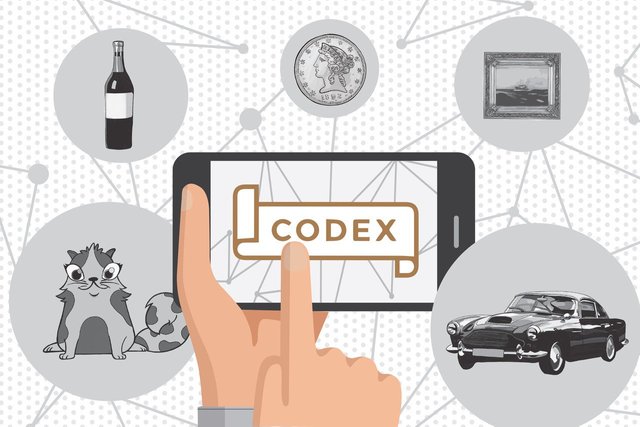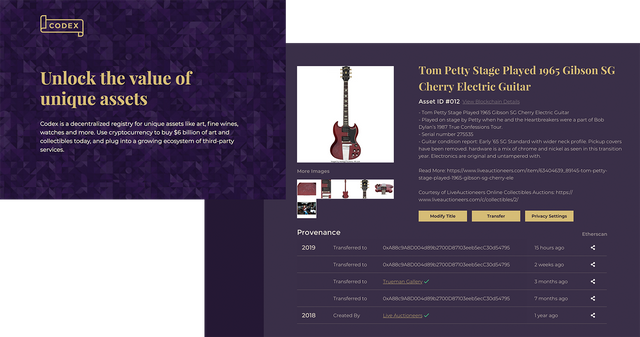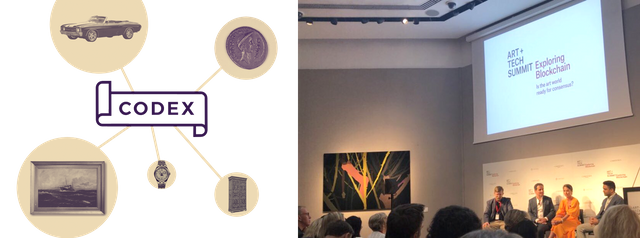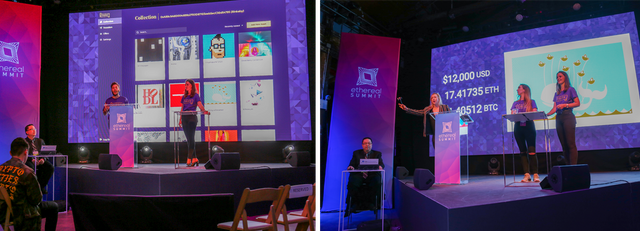Towards a New Marketplace [Interview with Codex - An Asset Registry Powered by Blockchain]

Codifying Tangible Value on the Blockchain
We’ve seen developments in blockchain heralded as the next wave of understanding digital money and information, upheaving our preconceptions about intangible “value.” But the one component that is often glazed over in crypto convo is what we’re going to do about things - big things, small things, things of economic worth, and the things we imbue with personal value throughout our lives. Codex, a new blockchain protocol dedicated to the Art and Collectibles market, stands to transform how we value and protect everything around us, from pocket-sized collectibles to family heirlooms and vintage automobiles.
Even if you don’t have a garage dedicated to successive Aston Martins or a viewing room of van Goghs, we are all affected by the difficulty of defending the value and ownership of our things. Whether it’s the threat of counterfeits of rare baseball cards or verifying that you are the original artist of a particular painting or proving ‘that’ is indeed your grandfather’s watch and is only sitting in a pawn shop because a pickpocket hawked it, our current systems have a tremendous time protecting rightful provenance and worth. Not anymore.
Today, we’re sitting down with the team behind Codex to learn more about their beginnings, current status, and how they stand to revolutionize the world of things.
The Creative Crypto (CC): Hello Codex team! Tell us a bit about your backgrounds and who you are.
Codex Protocol was founded in 2017 by Mark Lurie, CEO, Jess Houlgrave, COO, and John Forrest, CTO. The team has extensive experience launching products and increasing adoption in the art and collectibles market, with backgrounds in entrepreneurship, the arts, and technology.

Our team is fittingly decentralized, and at Codex, we are thrilled to be working toward building technology for an art market that will have blockchain at its core; establishing standards and mechanisms for a more fair industry where intermediaries, collectors, and artists stand to benefit.
CC: What is Codex and how did you come to the point of developing it? What are some of the major industry challenges you're trying to solve with blockchain?
For unique assets, provenance is fundamental to value. The identity, chain of ownership, and other metadata about an item determine its provenance, but verifying this critical information is a constant challenge that creates costly friction in the ecosystem. Given the private and fragmented nature of the arts and collectibles (“A&C”) market, centralized efforts have failed to solve this in the past causing fakes and forgeries to persist. Fortunately, tracking and verifying ownership and possession history is a perfect application for the blockchain.
Codex is a decentralized asset registry for the $2 trillion arts & collectibles ecosystem, which includes art, fine wine, collectible cars, antiques, decorative arts, coins, watches, jewelry, and more. Powered by the CodexCoin native token, the Codex Protocol is open source, allowing third-party players in the A&C ecosystem to build applications and utilize the title system.

With the provenance challenge solved, a wealth of opportunities open up for the A&C market. Codex users can easily access a variety of applications and services like asset-backed lending, insurance, fractional ownership, bidding, escrow and more.
CC: Do you think traditional models and corporations will be able/willing to adapt to your new protocols?
Building a protocol that becomes an industry standard requires the support of large stakeholders with diverse needs. For this reason, Codex Protocol is building a committed consortium of industry leaders, which currently includes auction-related online marketplaces and software providers that facilitate the sale of several billions of dollars of A&C. Items sold through these marketplaces can have Codex Records created for them at the point of sale, accelerating adoption of the Codex protocol.

-
Jess presents at Christie’s Art + Tech Summit
Artists have long been due credit for the dissemination of new trends and technologies, and in this community, that is recognized.
CC: What's the current status of Codex and what can we look forward to in the near future?
Codex has launched two initial decentralized apps (beta). The first, Biddable, launched in May 2018 during the Codex + Rare Ethereal Art Auction where a CryptoKitty was sold for a record-breaking amount and received wide notoriety in the blockchain art community. Today, Biddable lets you register and pay for arts and collectibles with cryptocurrency at over 5,000 auction houses in over 50 countries.

-
Codex presenting and auctioning at Ethereal NYC
CC: What are some other exciting prospects artists in particular will be able to take advantage of as decentralization becomes more mainstream? Maybe give us a play-by-play of what a creative professional will ideally experience/enjoy on your platform.
Applications built on Codex provide an efficient means of cataloguing and archiving work for artists, which will prevent manipulation of an artist’s market and could enable easier tracking of resale royalty payments. An artist or their estate could build a catalogue raisonée on Codex, encouraging their audience to propagate visibility into their collection over time by utilizing their Codex Records.
Those who create value for the network will be rewarded for doing so with CodexCoin. In particular, validators and application developers. Validators create value by contributing and verifying provenance information, and this will include creators and artists.
Separately, to show our support of artists engaging with blockchain, Codex has started the Art + Blockchain Foundation and has contributed to projects like the Doge-Ethereum art project.
CC: For other creatives and entrepreneurs looking to get into the blockchain space for the first time, what would you say to them?
Now is the time to start engaging with the blockchain! There are many exciting ways that blockchain technologies are expected to transform markets, and those who are first to recognize and capitalize on the opportunity will stand to benefit.
It has been incredible to see how the blockchain community respects, includes, and encourages creatives to start utilizing this technology. Artists have long been due credit for the dissemination of new trends and technologies, and in this community, that is recognized. Until now, though, artists have been challenged with maintaining the rights and control of their assets, whether digital or physical. With the blockchain, there are finally mechanisms to change this that will empower artists and benefit all who appreciate art and unique assets.
A big thank you to the Codex team for discussing their platform with us! Learn more about Codex by exploring the links and resources below.
Project Name: Codex
Website: https://codexprotocol.com/
Twitter: https://twitter.com/CodexProtocol
Medium: https://medium.com/codexprotocol/
Cover Illustration by @aaronhong

Posted from my blog with SteemPress : https://thecreativecrypto.com/towards-a-new-marketplace-interview-with-codex-an-asset-registry-powered-by-blockchain/
Hey team is this project based on ERC: Non-fungible Token Standard #721?
Good question - Yes! The Codex Registry is the ERC-721 smart contract. And CodexCoin is the ERC-20 utility token which are used as fees for write operations in the registry.